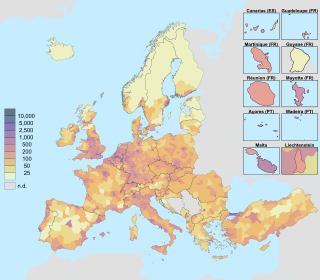Related Research Articles

Human capital flight refers to the emigration or immigration of individuals who have received advanced training at home. The net benefits of human capital flight for the receiving country are sometimes referred to as a "brain gain" whereas the net costs for the sending country are sometimes referred to as a "brain drain". In occupations that experience a surplus of graduates, immigration of foreign-trained professionals can aggravate the underemployment of domestic graduates, whereas emigration from an area with a surplus of graduates leads to better opportunities for the ones left. The other way around, with occupations or areas with a lack of graduates, emigration will lead to more difficulties concerning the area.
Since 1945, immigration to the United Kingdom under British nationality law has been significant, in particular from the Republic of Ireland and from the former British Empire especially India, Bangladesh, Pakistan, the Caribbean, South Africa, Nigeria, Ghana, Kenya and Hong Kong. Other immigrants have come from member states of the European Union, exercising one of the European Union's Four Freedoms, and a smaller number have come as asylum seekers, seeking protection as refugees under the United Nations 1951 Refugee Convention.
The foreign-born population of the United Kingdom includes immigrants from a wide range of countries who are resident in the United Kingdom. In the period January to December 2016, there were groups from 22 foreign countries that were estimated to consist of at least 100,000 individuals residing in the UK.

Immigration is the international movement of people to a destination country of which they are not natives or where they do not possess citizenship in order to settle as permanent residents or naturalized citizens. Commuters, tourists, and other short-term stays in a destination country do not fall under the definition of immigration or migration; seasonal labour immigration is sometimes included, however.

MigrationWatch UK is a British think-tank and campaign group which argues for lower immigration into the United Kingdom. Founded in 2001, the group believes that international migration places undue demand on limited resources and that the current level of immigration is not sustainable.
African immigrants in Europe are individuals residing in Europe who were born in Africa, this includes both individuals born in North Africa and Sub-Saharan Africa.
Opposition to immigration also known as anti-immigration has become a significant political issue in many countries. Immigration, in the modern sense, refers to the entry of people from one state or territory to another state or territory in which they are not citizens. Illegal immigration is immigration violating a state's immigration laws.
Latin American migration to the United Kingdom dates back to the early 19th century. However, up until the 1970s, when political and civil unrest became rife in many Latin American countries, the United Kingdom's Latin American community was not particularly large. Economic migration to the United Kingdom has since increased. Brazilian and Colombian-born residents are the two largest groups standing at 95,000 and 36,000 respectively as of 2019. A number of refugees and asylum seekers moved to the UK during the late 20th century, however, since the turn of the millennium, Latin Americans have been migrating to the UK for a wide range of reasons and at present the community consists of people from all walks of life. The UK is also home to British-born people of Latin American ancestry, as well as some Hispanic and Latino Americans. During the 2008–2014 Spanish financial crisis, Britain also became one of the favourite European destinations for some of the roughly 1.4 million Latin Americans who had acquired Spanish citizenship.
Immigration to Europe has a long history, but increased substantially in the later 20th century. Western Europe countries, especially, saw high growth in immigration after World War II and many European nations today have sizeable immigrant populations, both of European and non-European origin. In contemporary globalization, migrations to Europe have accelerated in speed and scale. Over the last decades, there has been an increase in negative attitudes towards immigration, and many studies have emphasized marked differences in the strength of anti-immigrant attitudes among European countries.
British migration to Spain has resulted in Spain being home to one of the largest British-born populations outside the United Kingdom in the world, and the largest in Europe. Migration from the UK to Spain has increased rapidly since the late 1990s and the registered population of British nationals in Spain in 2014 was 297,229 (2014).

The demographics of the European Union show a highly populated, culturally diverse union of 27 member states. As of 1 February 2020, the population of the EU is about 445 million people.

The United Kingdom European Union membership referendum, commonly referred to as the EU referendum or the Brexit referendum, took place on 23 June 2016 in the United Kingdom (UK) and Gibraltar to ask the electorate whether the country should remain a member of, or leave, the European Union (EU). The result would then be facilitated through the European Union Referendum Act 2015 and also the Political Parties, Elections and Referendums Act 2000. The referendum resulted in 51.9% of the votes cast being in favour of leaving the EU. Although the referendum was legally non-binding, the government of the time promised to implement the result. The succeeding government, led by Theresa May, initiated the official withdrawal process on 29 March 2017, meaning that the UK was due to leave the EU on 29 March 2019. This negotiation period was later extended until 31 October 2019. After May failed to secure the backing of Parliament on her Brexit deal, she resigned as Prime Minister, and was succeeded by Boris Johnson. Johnson then extended the negotiation period again until 31 January. At 11 pm GMT on 31 January 2020, the UK officially withdrew from the EU.
This article delineates the issue of immigration in different countries.

The European migrant crisis, also known as the refugee crisis, was a period characterised by high numbers of people arriving in the European Union (EU) overseas from across the Mediterranean Sea or overland through Southeast Europe. In March 2019, the European Commission declared the migrant crisis to be at an end, although displaced people continued to arrive.
Issues in the United Kingdom European Union membership referendum, 2016 are the economic, human and political issues that were discussed during the campaign about the withdrawal of the United Kingdom from the European Union, during the period leading up to the Brexit referendum of 23 June 2016. [Issues that have arisen since then are outside the scope of this article].
The Brexit result in the 2016 United Kingdom European Union membership referendum is one of the most significant political events for Britain during the 21st century. The debate provoked major consideration to an array of topics, argued up-to, and beyond, the referendum on 23 June 2016. Factors including sovereignty, immigration, the economy and anti-establishment politics, amongst various other influences. In the end, the British public voted in favour with a slim margin of 51.8% to leave the European Union in a non-legally binding referendum. The formal withdrawal of the EU took place when Theresa May triggered article 50 of the Lisbon Treaty on 29 March 2017. This page provides an overarching analysis of the different arguments which were presented by both the Leave and Remain campaigns.

During 2017, 2018, and 2019, representatives of the United Kingdom and the European Union negotiated the terms for Brexit, the planned withdrawal of the UK from the EU. These negotiations arose following the decision of the Parliament of the United Kingdom to invoke Article 50 of the Treaty on European Union, following the UK's EU membership referendum on 23 June 2016.
Christian Dustmann, FBA, is a German economist who currently serves as Professor of Economics at the Department of Economics of University College London. There, he also works as Director of the Centre for Research and Analysis of Migration (CReAM), which he helped found. Dustmann belongs to the world's foremost labour economists and migration scholars.

This article outlines the delivered and predicted impact of Brexit, the withdrawal of the United Kingdom (UK) from the European Union (EU) and the European Atomic Energy Community.
Eastern Europeans living in the United Kingdom have been present in the country, in small numbers, for several centuries, with subsequent large migrations in the 21st-century. The group can usually trace back full or partial heritage to Russia, Ukraine, Belarus, Moldova, as well as nations which border with, or are otherwise ethnoculturally connected to, Eastern Europe.
References
- ↑ Claudia Roscini (2017), "Glossary", Multiculturalism Caveat: Potential Antecedents of Intergroup and Acculturation Attitudes, University of Greenwich, p. xix,
Minority Group: The cultural and ethnic minorities in the country in which acculturation takes place(i.e. Asians or Eastern and Southern Europeans in the UK).
- ↑ "AMEC Network Start-up Workshop: Mobilities in Times of Economic Crisis" (PDF). Lisbon: IMISCOE. 27 February 2014.
Majella Kilkey & Roxana Barbulescu (The University of Sheffield, Sheffield, UK) – Crisis-influenced mobilities: the re-emergence of ‘South’-‘North’ intra-European labour mobility. Southern Europeans in the UK.
- 1 2 3 "Articulating identity options: Eastern and Southern European migrants in Britain". St Antony's College, Oxford: University of Oxford. 27 February 2019.
I relate the different ways in which East and South European migrants articulated their identities to the British context of reception, and the positive or negative discourses surrounding specific ethnicities and migrant groups. I also discuss how the EU Referendum potentially reshuffled these hierarchies and representations.
- 1 2 Alessio D’Angelo; Eleonore Kofman (2016), "UK: Large-Scale European Migration and the Challenge to EU Free Movement", South-North Migration of EU Citizens in Times of Crisis, Springer Publishing, pp. 175–192, ISBN 978-3319397610,
The UK’s opening up to the new member states was seen as a means of reorienting immigration for less skilled jobs from third country nationals to Eastern Europeans. However, less noticed was the concurrent growing immigration of Southern Europeans. With the deepening effects of the economic crisis and welfare cuts since 2010, the numbers of Italians and Spanish migrants registered for work have risen sharply. Today the UK is the first destination country for young, and often tertiary educated, Southern European migrants.
- ↑ David Milliken (22 August 2019). "Immigration to Britain falls to five-year low ahead of Brexit: ONS". Reuters .
Immigration to Britain from the rest of the European Union surged after the euro zone debt crisis in 2012, as southern Europeans sought better job opportunities in Britain, on top of east Europeans seeking higher wages.
- ↑ Alvin Chang (June 24, 2016). "Brexit: why Britain left the EU, explained with a simple cartoon". Vox Media .
As my colleague Zack Beauchamp writes, "The British labor market was relatively easy to break into, and lots of people across Europe speak English, so it was a natural target for these Southern Europeans."
- ↑ "Southern Europeans flock to UK for jobs". EURACTIV . September 23, 2016.
Britain, and especially London, has become a popular place for tens of thousands of southern Europeans in search of work as the governments of Spain, Portugal and Italy continue to impose austerity measures.
- ↑ Tatiana Eremenko; Nora El Qadim; Elsa Steichen (2016), "Southern Europeans in France: Invisible Migrants?", South-North Migration of EU Citizens in Times of Crisis, Springer Publishing, pp. 123–148, ISBN 978-3319397610,
The current economic crisis does not appear to have changed this evolution and France has not emerged as an important destination for Southern European migrants as have Germany and the UK ... Although their numbers have increased and represent a growing proportion of recent flows to France (Brutel 2014), they remain low compared to numbers in Germany and the UK ... As mentioned earlier, we observe an increase of the three groups of Southern Europeans since the crisis: in the period 2006–2011, the number of recent migrants from Southern Europe living in France increased from around 53,000 to 78,000, with a particularly strong increase for Portugal (+15,000) (Table 8.3).
- ↑ Iraklis Dimitriadis; Giovanna Fullin; Maricia Fischer-Souan (2019), "Great Expectations? Young Southern Europeans Emigrating in Times of Crisis", Mondi Migranti, FrancoAngeli, pp. 127–151,
In addition, it sheds light on the perceptions that young Italians and Spaniards have of the Berlin and London labour markets. The findings suggest that positive images of the Berlin and London economies, together with a lack of hope for sustainable economic recovery in the country of origin impact migration decisions, and may also encourage migrants who face challenges in the labour market of destination countries to accept poor employment conditions, rather than leave the new society.
- ↑ Peter Ackroyd (2000). "Maybe It's Because I'm a Londoner". London: The Biography . Chatto & Windus. ISBN 978-0099422587.
There were, however, occasions of criticism. “I do not at all like that city,” Richard of Devizes complained in 1185. “All sorts of men crowd there from every country under the heavens. Each brings its own vices and its own customs to the city.” In 1255 the monkish chronicler Matthew Paris was bemoaning the fact that London was “overflowing” with “Poitevins, Provençals, Italians and Spaniards.”
- ↑ Akgüç, M.; M. Beblavý (2015), Re-emerging Migration Patterns: Structures and Policy Lessons, CROME: Centre for European Policy Studies, p. 22,
In the case of UK, looking at Southern European migrants in Figure 7 shows that until 1990s there has been a decrease in low-skilled, which constitute the major share compared to other skill groups, and a gradual increase afterwards. However, even more striking is the sharp increase (almost 10-fold) in the stock of high-skilled migrants from Southern Europe from around 10,000 in early 1990s reaching more than 100,000 in 2010. Although this figure is dwarfed compared to hose of migrants from non-EU, it still highlights the important change in the skill composition of Southern Europeans in the UK.
- ↑ Helen N.J. McCarthy (2019), "Spanish nationals' future plans in the context of Brexit", Population, Space and Place - Special Issue: Negotiating Brexit: Migrant spatialities and identities in a changing Europe (Volume 25 ed.), Wiley,
Southern Europeans forced to "escape" unemployment in their home country and arriving in the United Kingdom to work in jobs below their qualification.
- ↑ Quassoli, Fabio; Dimitriadis, Iraklis (2019), "Here, There, in between, beyond…": Identity Negotiation and Sense of Belonging among Southern Europeans in the UK and Germany (Volume 7 ed.), Social Inclusion, pp. 341–351,
This article draws on data from a Horizon 2020-funded research project on intra-EU mobility that aimed to explore migrants’ lived experiences (Growth,Equal Opportunities, Migration and Markets [GEMM] project). Between November 2016 and June 2017, 160 in-depth interviews were carried out with Italian and Spanish migrants in the UK and Germany.
- ↑ Michael L. Ross (2006). "The London Charivari". Race Riots: Comedy and Ethnicity in Modern British Fiction. McGill-Queen's University Press. p. 67. ISBN 978-0773531093.
Southern Europeans in England enjoyed no exemption from Punch s parochial laughter, as witness the Frank Reynolds drawing of 10 March 1920, in which a tall, swaggering policeman accosts a diminutive, swarthy, doubtless Italian street-musician
- ↑ Mazzilli, Caterina; King, Russell (2019), ""What have I done to deserve this?". Young Italian migrants in Britain narrate their reaction to Brexit and plans to the future", Rivista Geografica Italiana, Nabu Press, pp. 507–523,
Our interviewees were aware that, coming from one of the founder-members of the EU, they have long held the right to be freely mobile within Europe, and hence regard themselves as “old” migrants enjoying, until now, relative “invisibility” in the UK (Colpi, 2017; Favell, 2008; Ricucci, 2017). Moreover, Ricucci (2017) points out that, during her research on young Southern European migrants in London, not a single one of her interviewees used the word “migrant” or “immigrant”, thus deliberately detaching themselves from this category.